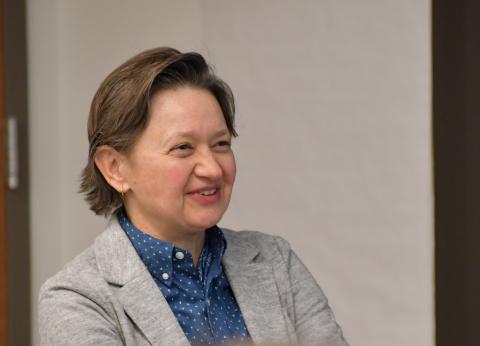 On January 20th researchers from across the U.S. gathered in the Physics Department for a five-day workshop to discuss main ideas behind the envisaged NSF Quantum Leap Challenge Institute on the Identification and Control of Fundamental Properties of Quantum Systems.
On January 20th researchers from across the U.S. gathered in the Physics Department for a five-day workshop to discuss main ideas behind the envisaged NSF Quantum Leap Challenge Institute on the Identification and Control of Fundamental Properties of Quantum Systems.
Twenty-six presenters from universities and national labs tackled the difficult problem of how to achieve a true quantum leap. Professor Vesna Mitrović led the effort. “It’s a really complicated problem and my job here was to get the right people together to address it and in the process to refine the idea for achieving a quantum leap.”
Participants presented and discussed topics such as Probes of Topological Order, Quantum Sensing, Resources for Quantum Computation, and Coherent Control of Quantum States. Attendees engaged in extensive discussions to define the scope of work needed to achieve and advance quantum sensing. The different aspects of quantum phenomena that can be utilized for the development of quantum sensing, holds the promise of enabling new discoveries in science and finding ways to defy natural limits of precision measurements that would go beyond the standard quantum limit.
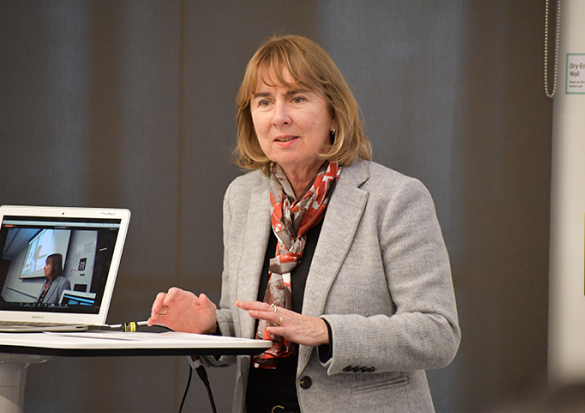
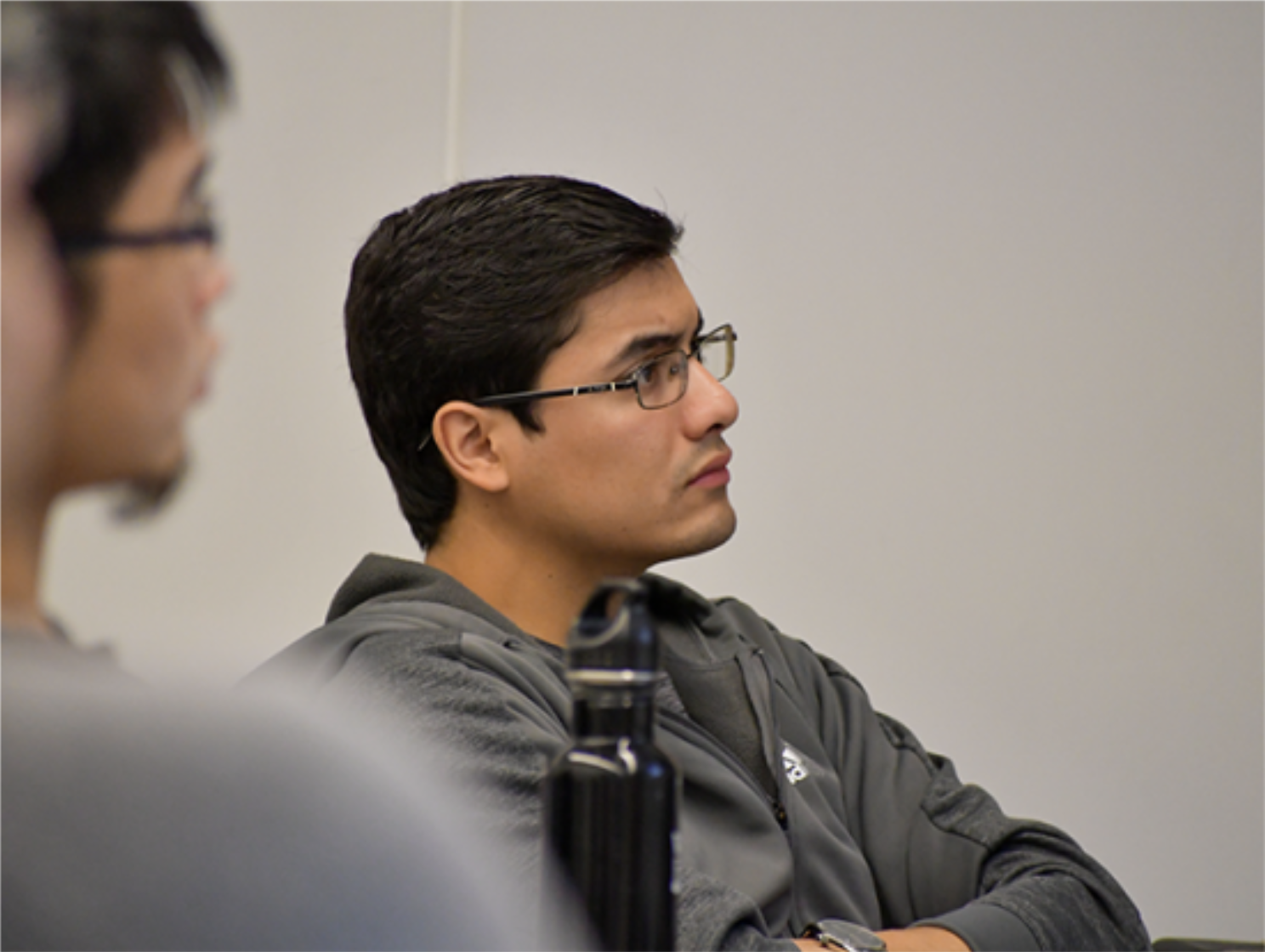
Entanglement, which is a unique feature of quantum material, and is related to quantum sensing presents the challenge of being difficult to probe using standard experimental methods. Novel ideas were considered for experimentally probing entanglement. Theoretical physicist, Professor Adrian Del Maestro, from the University of Vermont explains, “I am interested in entanglement in many-body systems and how this could potentially be useful as a resource to obtain quantum speedups in information processing. Sensing plays a double role here, both in the ability to validate the suitability of a given phase of quantum matter and in terms of read-out of quantum states. The mix of experimentalists and theorists at this workshop has a high potential of making a significant impact on future quantum technologies.”
Formulating next steps after this workshop includes assembling a great team and solidifying that this group of scientists has the capability to reach the next quantum leap. “There’s a lot of excitement in the condensed matter community to use this momentum from the ongoing funding surge from NSF to pursue fundamental research connected to quantum physics. NSF discusses the current research developments as a “second quantum revolution” and, from the front lines, it is indeed a really exciting time.” said Professor Erik Henriksen, an experimental physicist, from Washington University in St. Louis.
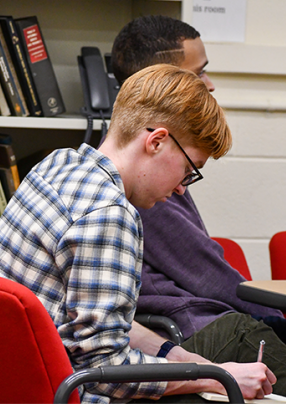
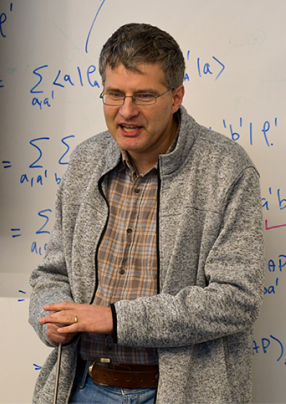
"Thermal Probes of Topological Order"
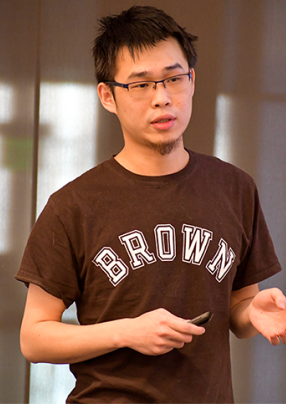
Prof. Brad Marston) presents on
"Charge Transport and Control in
Topological Materials
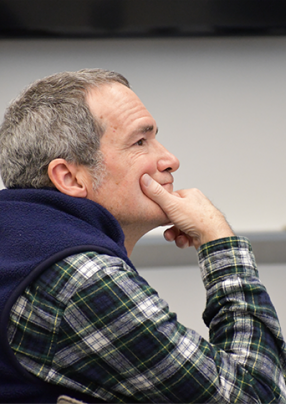
When asked what happens next after this workshop, Mitrović stated, “We have a great team with needed complementary expertise to tackle the main ideas of the Challenge Institute. I’m very excited for the possibility to work on these problems and I feel confident we will produce great results and make major breakthroughs in quantum science.”
The NSF Quantum Leap Challenge Institute Workshop was funded by the National Science Foundation.
The workshop was organized by Professors Vesna Mitrović, Dmitri Feldman, and Brad Marston.
Speakers:
|
Eric Henriksen - WUSTL "Quantum Sensing at Washington U in St. Louis" |
Dan Mittleman - Brown "Terahertz Techniques" |
Adrian Del Maestro - UVM "Entanglement subject to superselection rules" "Resources for quantum computation" |
|
Martin Gustafsson - "2D quantum devices and quantum microwave control" |
Thorsten Maly - Bridge12 "Instrumentation for High-field/High-frequency DNP/EPR Spectroscopy" |
Stephen Carr - Harvard/Brown "Topology in 2D materials" |
|
Raphael Pooser - ORNL "Quantum sensing with quantum optics" |
Emilio Cobanera - SUNY PolyTech "Probes of topological order (TO) & Resources for QC" |
Dima Feldman - Brown "Thermal probes of topological order (TO)" |
|
Ashok Ajoy - CMU "Nuclear hyperpolarization assisted quantum sensing" |
Andrew Mounce - Sandia "Opportunities for quantum sensing utilizing NV in diamond and discovering for the next solid state quantum sensor" |
Nandini Trivedi - OSU "Prediction and detection of quantum entanglement in quantum spin liquids" |
|
Joe Checkelsky - MIT "Correlation and topology in quantum materials" |
Sekhar Ramanathan - Dartmouth "Engineering the dynamics of nuclear and electronic spins" "Exploring many-body dynamics in dipolar-coupled spin systems" |
J. Leo Li - Brown "Thermal transport measurements" |
|
Peter Weber - Brown |
Weichman Peter - "Quantum Measurement Modeling" |
Kemp Plumb - Brown "Searching for signatures of TO in frustrated magnetic materials" |
|
Thomas Sgouros - Brown "Error correction and learning not to care" |
Antal Jevicki - Brown "Entanglement in coupled quantum systems" |
Jim Valles - Brown "Investigating quantum coherence in Bose metal" |
|
Kanpur Shukla - Brown "Principles of Reversible Quantum Computing" |
Andrey Gromov - Brown "Self-correcting quantum memory" |
Zekun Zhuang - Brown "Charge transport and control in topological materials" |